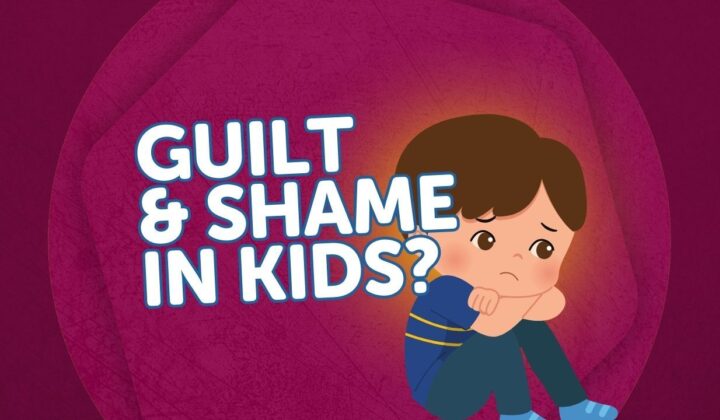Learn more about the journey that led to us equipping kids to carefully evaluate every idea they encounter.
Meet members of our team who have contributed to curriculum development.
Hear from real users of the Foundation Curriculum.
Learn what we believe about God, Jesus, Scripture, and more.
Imagination vs. Lying: Helping Kids Understand the Difference
Today's question says, "How do we balance encouraging a child's imagination while also encouraging truth-telling and disciplining them for lying?"
Transcript
Note: The following is an auto-transcript of the podcast recording.
Hello friends, and welcome to another episode of the Foundation Worldview Podcast where we seek to answer your questions so that you can equip the children that God has placed in your care to carefully evaluate every idea they encounter and understand the truth of the biblical worldview. I'm your host, Elizabeth Urbanowicz, and I'm thrilled that you've joined me for another episode today. Today's question says, "How do we balance encouraging a child's imagination while also encouraging truth-telling and disciplining them for lying?" Really interesting question and one that it's important for us to think through that if we want to encourage imaginative play. How do we do that while also helping our children understand that telling the truth is very important? And that's the question we're going to dive down deep into today.
But before we do that, ask that you would just take the two to three seconds that it takes to give this podcast a five star rating. It just helps people discover the content so long as you consider it five stars. Also, if you're watching on YouTube, please just give us a little thumbs up or leave a comment. All of those things just help more people discover this content so that we can equip an even broader audience to help the kids in their care understand the truth of the biblical worldview.
Now, as we're thinking through, okay, how do we both encourage imaginative play and help our kids understand the importance of truth? The first thing that we need to do is just establish the foundation of what truth is. Now, for those of you who have taken your children through Foundation Biblical Worldview curriculum, that is the entire first unit of that curriculum, we spend five whole lessons focusing on the concept of truth. So if you're interested in establishing that foundation, highly recommend you check out that curriculum. Also, you can check out our book, What Is Truth?, which is a picture book for little ones ages four to about seven, maybe eight, just establishing the concept of truth that our kids have to understand that truth is what is real. Now then when we think about introducing the concept of imagination, we don't necessarily even need to introduce the concept because little ones just inherently understand what imagination is because they love to have imaginative play. And it's so important for us, especially in this day and age where so much screen time is encouraged and viewed as normal. What screen time does is it really inhibits children from developing a strong imagination, from being able to visualize things and being able to visualize things is so important, especially when we think about the fact that the hope that we're presenting to our children, the hope of eternity is not something that at the moment they can tangibly see.
It's so important that they have the ability to visualize the things that are written about in Scripture, that they can see those things in their mind to understand this hope that we have in Christ. So actually talking with our kids about the gift of imagination, the first thing I think we need to do is we need to help them understand that imagination is a good gift from God. I mean, even just thinking, if you try to visualize something, think about your mom when you were growing up in a happy memory that you have with your mom, you can close your eyes and you can visualize that memory. But where actually is that image located? Scientists, neuroscientists could tell us the different regions of our brain that are stimulated and on an EEG lit up when we are visualizing that memory. But is that picture actually physically located inside of our brain? No, it's not. It is this metaphysical reality that God has given us and it's such a good gift. So we want to talk with our kids about imagination being a good gift from God. Now with little ones who might not be able to even verbalize the word imagination, yet, a good synonym for imagination is pretending you can be imagining something, you can be pretending something.
The next thing I think we need to do is talk with our kids about how any good gift from God on this side of Genesis three in some ways has been corrupted. So imagination is inherently a good gift. Pretending is inherently a good gift. However, on this side of Genesis three, there's good kinds of pretending and then there's bad kinds of pretending, and we don't have to go through all bad kinds of pretending with our children, but we can talk with them about what some bad kinds of pretending would be: pretending that we are hurting one another, pretending that we are doing something that goes against God's good design.
A great passage of Scripture to take our children to is the fourth chapter of Philippians. So Philippians 4 verses four through eight, and in this section Paul writes, "Rejoice in the Lord always; again, I will say, rejoice. Let your reasonableness be known to everyone. The Lord is at hand; do not be anxious about anything, but in everything by prayer and supplication with thanksgiving let your requests be made known to God. And the peace of God, which surpasses all understanding, will guard your hearts and your minds in Christ Jesus. Finally, brothers, whatever is true, whatever is honorable, whatever is just, whatever is pure, whatever is lovely, whatever is commendable, if there is any excellence, if there is anything worthy of praise, think about these things." And so we can go through this passage with our kids and say, okay, what are the things that we are commanded to do? If you've taken your children through Foundation Studying the Bible curriculum, you can use the terminology prescribed because this passage right here is prescriptive. It's telling us things that we are to do, and so what's the first thing that we're commanded or prescribed to do to rejoice in the Lord? We're commanded to rejoice in God. We're commanded not to be anxious about things, but to give thanks and present our request to God. Then we're commanded to focus our minds on whatever is true, honorable, just pure, lovely, commendable, excellent, worthy of praise. So talk to our kids. Okay, so what does that mean about our imagination, about our pretend playtime? Then anything that we're pretending or imagining should fall in this category. Okay, so once we've then laid this biblical foundation for understanding truth, for understanding imagination as a good gift from God, then what we want to do is we want to help our kids see the difference between pretending or imagining something and lying about something.
And so we can help our kids understand that pretending or imagining is using God's good gift of imagination. Now, it can be done in a good way that aligns with God's good design or can be done in a bad way that does not align with God's good design. But if it's aligning with God's good design, if it's falling in that category of the fourth chapter of Philippians, then pretending or imagining is a good thing. Lying on the other hand, is trying to convince people of something that is not true. Now, when we're pretending it should be obvious to ourselves and to anyone else who's involved in this, that we are just pretending. That what we're doing is not real. However, lying is trying to convince others that something which is not true is true. So we want to help our kids understand the difference between this. And, so, you can help them understand if you're working with little ones, you can say, okay, we could pretend that we are going out to a restaurant, so we could pretend we could hop on the sofa, pretend we're in the car, then we could pretend to get out, and we could pretend to sit at the table and we're ordering food at a restaurant that's just pretending we're having fun with God's good gift of imagination. Where lying would be if a friend came over that afternoon and we said, oh, we went to a restaurant this morning. If we tried to convince them that we actually left our house and ate at an actual restaurant, that would be a lie. So we can give our kids different examples of this. Where then we want to help them understand why this is wrong.
And so in our Biblical Worldview curriculum at Foundation Worldview, we explain in one of our lessons that God is the source of truth. That means that all truth ultimately stems from him. And the way we help little ones understand this is we give them examples of things that are sources of other things. And so we talk about how chickens are the source of most of the eggs that we eat. Cows are the source of most of the milk that we drink, that trees are the source of most of the wood that we have. And so then we talk about God is the source of truth. That means all truth comes from him. And then we want to help our kids understand that lying is wrong, not because God just arbitrarily chose it to be wrong, but because lying actually goes against God's character. In Hebrews chapter six, verse 18, the author of Hebrews writes, "...it is impossible for God to lie...". God cannot lie because he is the source of truth. So we want to help our children see that pretending is play that does not inherently go against God's character. Now, if we're playing things that go against God's moral law, then yes, that goes against God's character. However, pretending can be good pretending it can go along with God's character. So as long as we're not trying to deceive others, and as long as we're pretending things that align with Philippians 4:8 pretending can follow God's good design for imagination. Where anytime we are lying, that is a direct affront to God's character. It goes against God's character. So lying cannot please God.
So this is something with our little ones that we want to discuss regularly when we're talking with them and they're talking about some imaginative play, we can ask, okay, is this pretending or is this lying? And then when we think that they are lying to us, we can ask them, are you pretending or are you lying right now? Okay, are you trying to convince me of something that is not true? So we want to make sure that this is just a regular conversation in our households because we don't want to inhibit our children's imaginations because we're teaching them about truth and they think, oh, I can't ever pretend something that's not actually really happening. No imaginative play is good play. We want our kids to be imaginative playing so long as it aligns with God's good design. We want them to be outside. We want them to be playing with things that are not just toys that have one purpose. We want them to spend most of their life off of screens so we can encourage this imaginative play so long as we're setting this, establishing this foundation for truth, helping them understand God's good gift of imagination and the boundaries that God has placed around that, helping them understand what lying is and how that's different than imagining.
And then we know because we are sinful, because our children are sinful. There are going to be times when our children lie to us, and there are going to be times when our children lie to others. And sadly, many times there might not, hopefully not many times, but sometimes there might even be times where we lie to our children or we lie to others. And when this occurs, whether it's us or our children, the proper response is confession and repentance. And so when we lie, God, after we confess and repent, we can trust that God will discipline us where He's put us in the role of authority with our children, so that when our children lie, there needs to be confession and repentance, and there also needs to be discipline so that our children remember the weight of their sin, and so that we're training them to live in ways that honor God.
Well, that's a wrap for this episode. But if you have a question that you would like for me to answer on a future Foundation Worldview episode, you can submit that by going to FoundationWorldview.com/podcast. And as we leave our time together, my prayer for you is the same as always, that no matter the situation in which you and the children God has placed in your care find yourselves, you would trust that God is working all things together for your good by using all things to conform you more into the image of His Son. I'll see you next time.
Related Posts and insights

Addressing Guilt and Shame in Young Children
Today's question says, "My youngest son, who is four, always resorts to saying 'I'm a bad boy,' or 'I'm bad' whenever he gets in trouble. I've made very sure to never say that he is a bad kid, but that he's making bad choices. I try never to shame but point out sin. We talk about repentance and forgiveness, but he just keeps saying it. What should I do?"

Talking To Kids About Their Sin Nature without Damaging Their Self-Esteem
In this episode of the Foundation Worldview podcast, host Elizabeth Urbanowicz answers a question that many Christian parents may have: how do we teach young children about their value and worth to God while also discussing the concept of sin?

How To Help Kids Discern The True Gospel From A False Gospel
The false gospel comes in numerous forms. Equip your kids and your family to tell the difference and embrace the true gospel.





